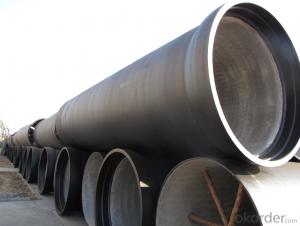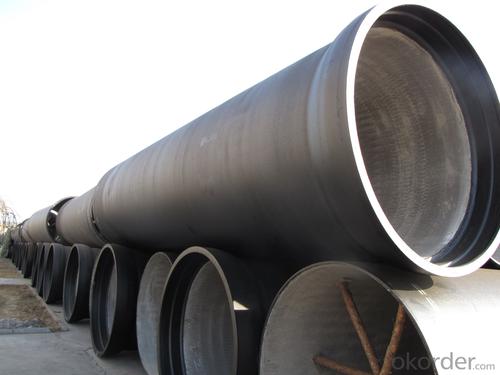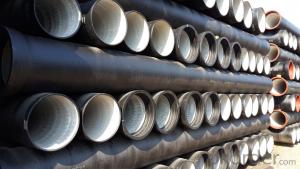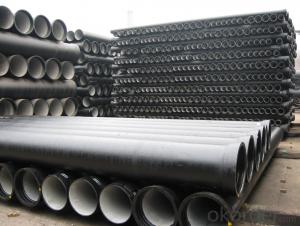Ductile Iron Pipe DN1400
OKorder Service Pledge
Quality Product, Order Online Tracking, Timely Delivery
OKorder Financial Service
Credit Rating, Credit Services, Credit Purchasing
You Might Also Like
Specifications
Quick Details
| Place of Origin: | China (Mainland) | Brand Name: | CMAX | Model Number: | T type / K type / Flange type |
| Length: | 6m / 5.7m / Negotiable | Standard: | ISO2531 / EN545 / EN598 | Application: | Potable / Sewage water |
| Diameter: | DN80~DN2200 | Shape: | Round | Hardness: | 230 |
| Pipe Wall Thickness: | standard | Pull Strength: | 420 | Yield (≥ MPa): | 300 |
| Material: | Ductile Iron | Type: | Centrifugal ductile cast iron pipe | Certification: | ISO2531 / EN545 / EN598 |
| Outer Diameter: | 80-2200 | Thickness: | standard | Specification: | DN80~DN2200 |
| |
The advantages to the customer:
Trustworthy financial strength.
One-stop shopping.
Fast and efficient service.
Coordination of shipments from multiple plants.
Specialists of the overseas shipping process.
A more competitive price.
- Q: Can ductile iron pipes be used for underground steam distribution systems?
- Yes, ductile iron pipes can be used for underground steam distribution systems. Ductile iron has excellent strength, durability, and resistance to high temperatures, making it suitable for carrying steam underground. Additionally, its corrosion resistance properties ensure a longer lifespan and reduced maintenance costs.
- Q: What are the typical pressure surge protection measures for ductile iron pipe?
- To ensure the integrity and longevity of ductile iron pipe, various measures are commonly employed to protect against pressure surges. These measures encompass the following: 1. Surge tanks serve as effective tools for absorbing and mitigating the impact of pressure surges on ductile iron pipe. These tanks are typically positioned strategically at critical points in the pipeline system, such as near valves or pump stations, providing a reservoir to contain excess pressure. 2. Air release valves are indispensable components within ductile iron pipe systems, serving the purpose of releasing trapped air and preventing the formation of air pockets. These valves maintain a stable pressure within the pipe, reducing the risk of pressure surges during operation or abrupt changes in flow. 3. Pressure relief valves are designed to safeguard ductile iron pipes by releasing excessive pressure when it surpasses a predetermined threshold. These valves are usually installed at strategic locations in the pipeline system and programmed to open when the pressure exceeds a safe limit, diverting the excess pressure to safeguard the pipe from damage. 4. Surge suppressors are devices installed in ductile iron pipe systems to absorb and dissipate pressure surges. These devices function as shock absorbers, lessening the impact of pressure fluctuations and protecting the pipe from harm. Surge suppressors are particularly effective in situations where pressure surges occur frequently or are severe. 5. Ensuring an appropriate pipe wall thickness is another critical measure for pressure surge protection in ductile iron pipe. By selecting a pipe with the correct wall thickness, engineers can guarantee the pipe's ability to withstand the pressure surges it may encounter during operation. This measure helps prevent pipe failure or rupture caused by excessive pressure. It is essential to note that the specific pressure surge protection measures employed for ductile iron pipe may vary depending on factors such as the application, pipe size, operating conditions, and regulatory requirements. Consulting experts in pipeline engineering and design is imperative to determine the most suitable pressure surge protection measures for a particular ductile iron pipe system.
- Q: Can ductile iron pipes be made into clear tubes?
- Not recommended to do the tube, mainly aesthetic problems
- Q: What is the expected external coating for ductile iron pipes?
- Typically, when it comes to ductile iron pipes, an expected external coating is applied to the pipe's outer surface. This coating serves as a protective layer, preventing corrosion and increasing the pipe's lifespan. Some common types of coatings for these pipes are polyethylene, polyurethane, and epoxy coatings. These coatings act as a barrier, shielding the pipe from contact with corrosive substances like soil, water, and chemicals. The choice of coating depends on factors such as the intended use, soil conditions, and required level of corrosion protection. Ultimately, the purpose of the expected external coating for ductile iron pipes is to ensure their longevity and durability in various environmental conditions.
- Q: What is the expected thermal expansion of ductile iron pipes?
- The expected thermal expansion of ductile iron pipes can vary depending on several factors such as the specific composition of the iron, the temperature range, and the length of the pipe. However, in general, ductile iron pipes have a coefficient of thermal expansion ranging from 10 to 13 microinches per inch per degree Fahrenheit (µin/in/°F). This means that for every one degree Fahrenheit increase in temperature, the ductile iron pipe will expand by approximately 10 to 13 microinches per inch in length. It is important to note that this value is an estimate and may vary slightly depending on the specific conditions and characteristics of the pipe.
- Q: Do ductile iron pipes require cathodic protection?
- Yes, ductile iron pipes do require cathodic protection. Cathodic protection is necessary to prevent the corrosion of ductile iron pipes, which can extend their lifespan and maintain their structural integrity. The protection is typically achieved through the use of sacrificial anodes or impressed current systems to counteract the natural corrosion process.
- Q: What are the typical joint restraint requirements for ductile iron pipes in seismic zones?
- In seismic zones, the typical joint restraint requirements for ductile iron pipes are designed to ensure the structural integrity and prevent displacement or separation of the pipes during seismic events. These requirements are crucial to maintain the reliability and functionality of the pipeline system. One common joint restraint requirement for ductile iron pipes in seismic zones is the use of flexible or mechanical joint systems. Flexible joints, such as rubber gasket joints, can absorb and accommodate the movement caused by seismic activity. These joints allow for axial movement, angular deflection, and expansion/contraction of the pipes, reducing the risk of pipe failure or damage. Another important requirement is the use of adequate anchoring systems. This involves securing the pipes to the surrounding structures or embedding them in concrete thrust blocks to prevent excessive movement or displacement during seismic events. Anchoring systems help distribute the forces generated by the earthquake and minimize the risk of pipe separation or breaking. Additionally, seismic design standards often require the use of seismic restraints, such as seismic joint restraints or bracing systems, to further enhance the stability and integrity of the ductile iron pipes. These restraints are designed to limit the movement of the pipes in specific directions, reducing the potential for damage and maintaining the overall system performance. It is important to note that the specific joint restraint requirements for ductile iron pipes in seismic zones may vary depending on local building codes, seismic activity levels, and engineering considerations. It is crucial to consult the relevant regulations and work with experienced professionals in the design and installation process to ensure compliance with the necessary requirements for seismic resistance.
- Q: What is the average weight of ductile iron pipe?
- The size and thickness of ductile iron pipe can cause fluctuations in its average weight. Typically, smaller diameters of ductile iron pipe weigh around 3.5 pounds per foot, while larger diameters can exceed 20 pounds per foot. It is essential to acknowledge that these weights are rough estimates and might slightly differ depending on the manufacturer and pipe specifications.
- Q: How are ductile iron pipes protected against external damage?
- Ductile iron pipes are protected against external damage through a combination of various protective measures. One common method used is the application of a protective coating on the external surface of the pipe. This coating acts as a barrier, preventing the direct contact of the pipe with corrosive elements in the surrounding environment. The coating can be made of materials such as epoxy, polyurethane, or zinc, which provide excellent resistance against corrosion, abrasion, and chemical attacks. Additionally, ductile iron pipes can be further protected by encasing them in a concrete or cement mortar lining. This lining provides an extra layer of protection, reducing the chances of physical damage due to external impacts or soil movement. The concrete or cement mortar lining also helps to improve the pipe's hydraulic performance by reducing friction and maintaining a smooth flow of water or other fluids. Furthermore, ductile iron pipes are often installed with proper bedding and backfilling techniques. This involves using suitable materials such as sand or gravel to support and stabilize the pipe, minimizing the risk of external damage caused by uneven ground settlement or heavy loads. Adequate compaction of the backfill material is crucial to ensure the long-term integrity and stability of the pipe. Regular inspection and maintenance are also essential for protecting ductile iron pipes against external damage. Periodic inspections can identify any signs of corrosion, coating degradation, or physical damage, allowing for timely repairs or replacement before significant issues arise. Additionally, proper cathodic protection systems can be employed to prevent corrosion by applying an electric current that counteracts the electrochemical reactions occurring on the pipe's surface. In summary, ductile iron pipes are protected against external damage through the application of protective coatings, concrete or cement mortar linings, proper bedding and backfilling techniques, and regular inspections and maintenance. These measures collectively ensure the durability, longevity, and reliable performance of ductile iron pipes in various environments and applications.
- Q: Can ductile iron pipe be used for marine applications?
- Yes, ductile iron pipe can be used for marine applications. Ductile iron is a type of cast iron that possesses high strength, durability, and resistance to corrosion. These properties make it suitable for various marine environments, including saltwater applications. Ductile iron pipes are commonly used for marine applications such as seawater intake and outfall systems, offshore oil and gas platforms, submarine pipelines, and marine dredging projects. The corrosion-resistant nature of ductile iron helps protect against the harsh conditions found in marine environments, such as corrosive saltwater, tidal currents, and marine organisms. Additionally, ductile iron pipes are known for their excellent mechanical properties, including high tensile strength and impact resistance, which further enhance their suitability for marine applications. Overall, ductile iron pipe is a reliable and cost-effective choice for various marine applications.
Send your message to us
Ductile Iron Pipe DN1400
OKorder Service Pledge
Quality Product, Order Online Tracking, Timely Delivery
OKorder Financial Service
Credit Rating, Credit Services, Credit Purchasing
Similar products
Hot products
Hot Searches
Related keywords




























